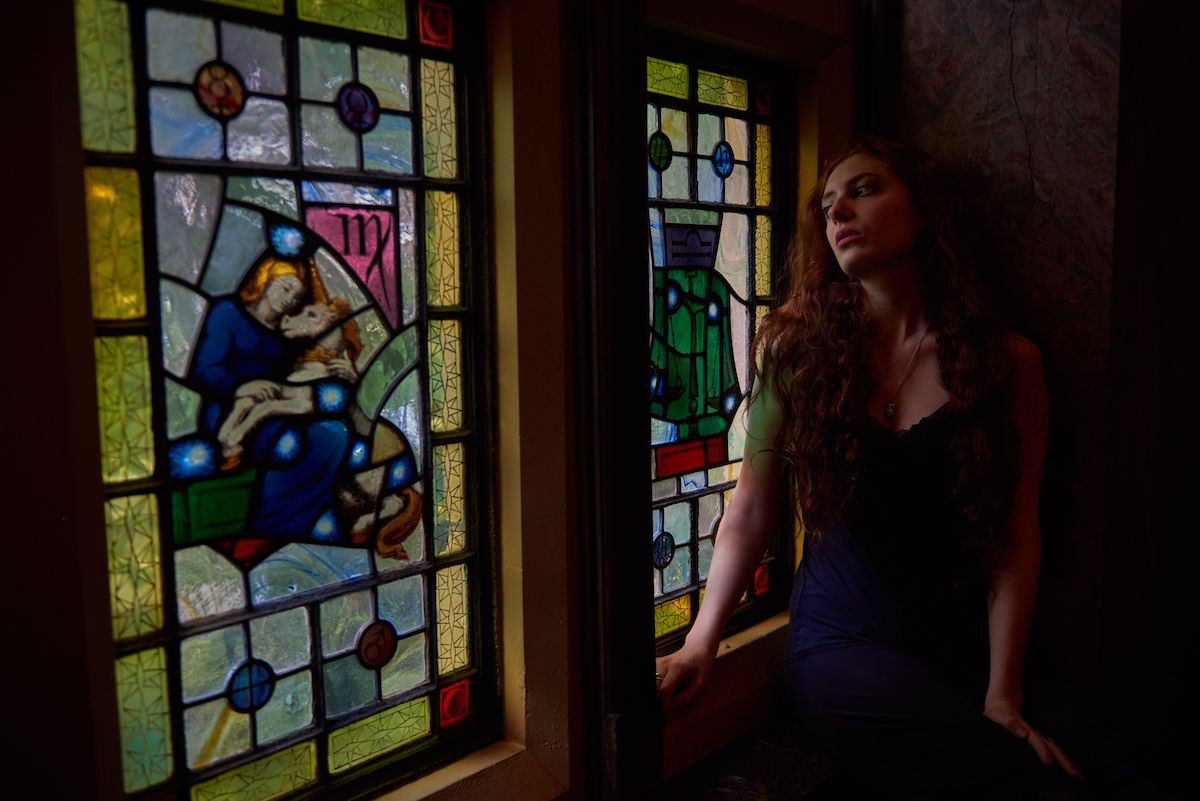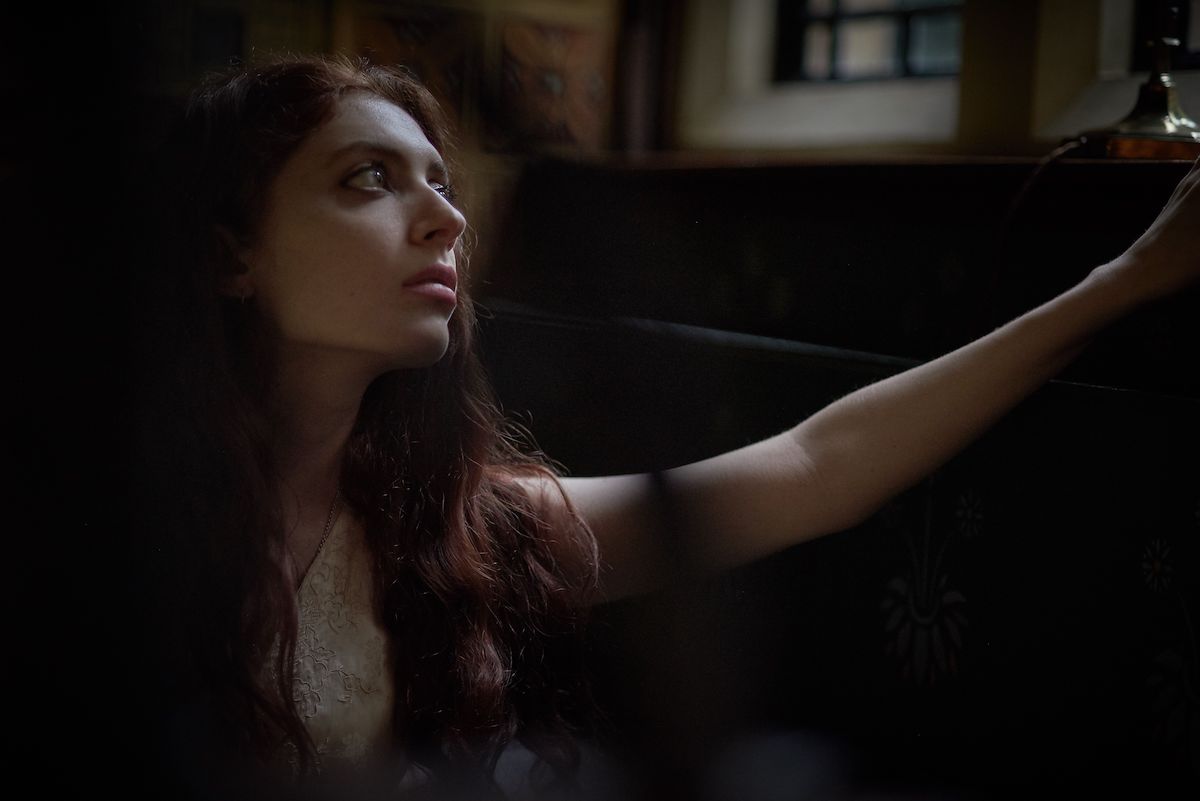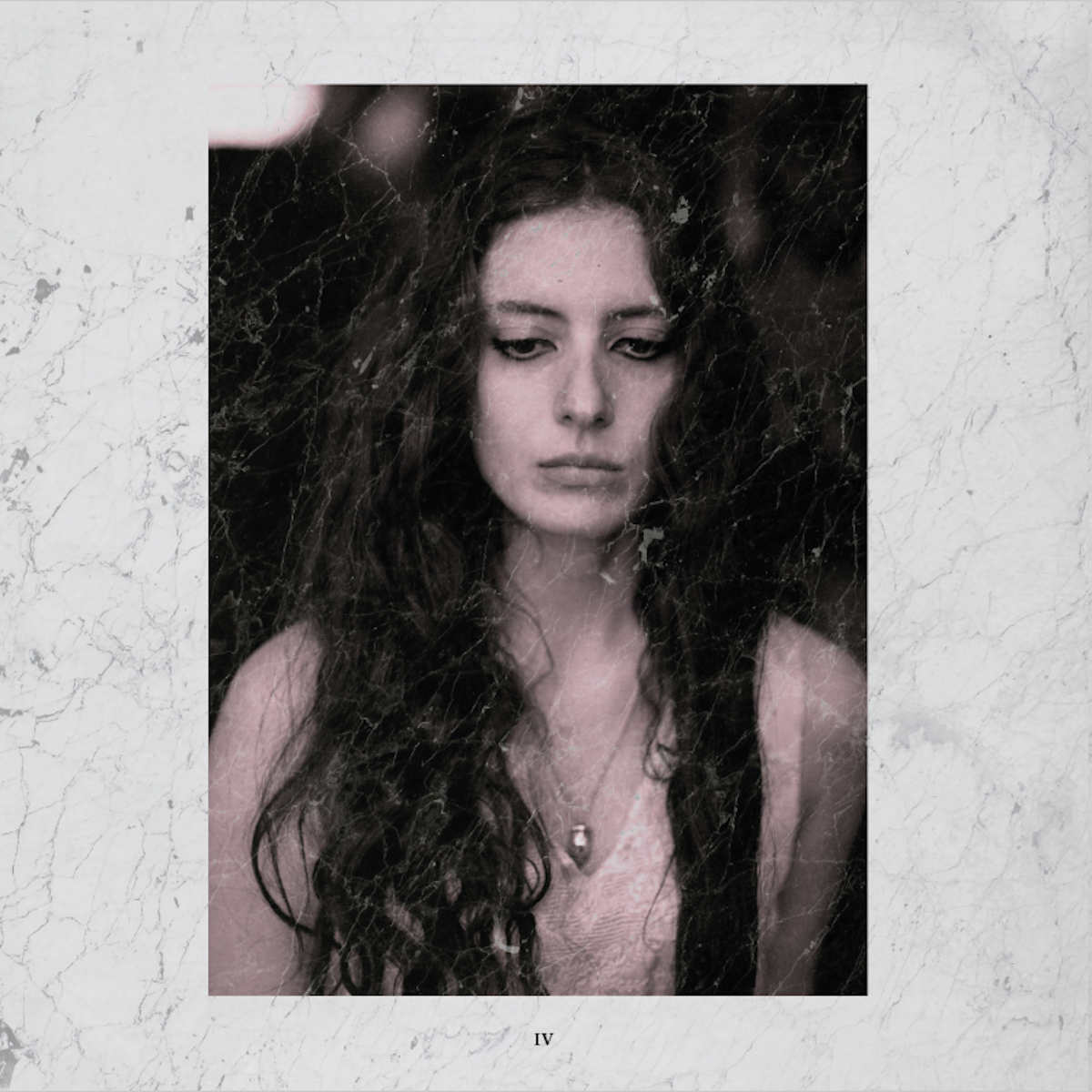The Extended Meld of Poet and Performer Scarlett Sabet
Culture — 11.11.20
Words by Brit Parks
All images by Scarlet Page from the Catalyst shoot

Scarlett Sabet is here to freeze your mouth. Vesuvius’s temper froze a civilization in hours. Scarlett knows the myth of temperament, she can coax a line from a delicate silence. Her poetics are steeped in a kind of cadence born of sympathy and measured observation. She has extreme volumes within her lithe frame which can only partly explain the sudden heat when she reads her work. She truly makes you wonder if either of you breathed for the length of her verse. You feel as if you have been hypnotised in a new language, you feel struck. Her instincts remain intact regardless of subject, on love she has the same ferocity of passion, on mourning, a bleeding heart to match any.
“Your mouth liquid and molten
And you give it and feed it too
Liquid and molten your mouth
You give it and feed it too”– Scarlett Sabet, “And My Lungs Fill With Ecstatic Song”
Bob Dylan holds he is a poet first, a musician second. There is an endless gaze game in this idea. In formal terms, you could consider language informing sound. You can also consider sound a language itself. I think if they were torn apart they would miss each other forever. Sabet and her partner Jimmy Page after several years together went down the mystic path of collaboration. Page, a legend of sound, arguably creating one of its greatest dialects, wanted to capture Sabet’s depthless words and her voice. No one has a voice like Sabet. She reads her work in an unknown fluid modulation, it’s a natural fascination to be moved to document. Page then layers and huzzes each poem with what could only be him, and only be them. Their album is called Catalyst, an objet d’art in its own right. Heavily weighted wax with an accompanying book of her poems and textural collages.
One night, I lay on my floor in the dark and played the record. I felt possessed. I kept reaching up to push start on the needle in repetition. Time started to disappear, I started to feel inside her words. I couldn’t tell if the soundscape was behind me, imagined, or intentional. Its singular quality is achieving the height of languages inextricably linked that become their own entity. Their own drug. The truly marvellous poetics are the ones that gnaw and intoxicate but never quite belong to you, they are borrowed with grace. In this case, borrowed twice from an unfrozen sound and language meld that moves the direction of your heart.

Brit Parks: I read Dylan say, “Sometimes a song can tell you how you feel when you don’t know.” Do you find your own emotions and experiences are more clearly defined to you through your work?
Scarlett Sabet: The poem is an articulation, something truthful captured in lines. It’s always interesting what people read into a poem and project onto it. There is a poem in my first collection Rocking Underground called “Shackles” for example – I know the specific moments, snapshots in my mind that are weaved into that poem, but I’ve been fascinated by what each person gets from it when I’ve shared it. So much of people’s reaction to art, and indeed, to life, is a reflection from their own projection.
Your poems often have a quality I call ‘delicate ferocity.’ Meaning, there is an endless pendulum of extreme delicacy of words employed and then in another swing, an extreme description of something quite harrowing which is exemplified in “And My Lungs Fill Ecstatic Song” and its track on Catalyst. I find this quality to be a defining aspect of your work with the shifts masterfully done. Can you speak to that spectrum as it evolves for you?
I wrote “And My Lungs Fill With Ecstatic Song” while walking along the river in the countryside. I happened to be listening to music, so I made some notes on my phone, that was October 2018. We went to St. Lucia that December, and I returned to what I had written and experimented with the sentence structure, used the cut-up technique, and created that poem. I wanted it to reach a euphoric cacophony, when reading that poem I sped up in the last verse. That poem is on Catalyst, and the effect that Jimmy achieved in his production aurally was what I was trying to create when writing it. We didn’t even have a conversation, he knew, I just said to him after listening, “How did you know? You created what I was trying to achieve.” That’s why creating Catalyst will always be the most magical time to me.
In terms of process, can you expand on any aspect of this undertaking? Do pieces come to you suddenly in a sweeping rush, or is it more of a set devotional moment where things coalesce?
I’m lucky that some poems have emerged in one sitting, and how they were published is how they were first written on paper, poems like “Fifth Circle of Hell” which is about the refugee crisis, and the love poem “Ocean”. The impulse and intention was there, the night before I wrote “Fifth Circle of Hell”, we had watched the news, it was August 2016 when the press was focusing a lot on the refugee crisis, I had written some notes in my Moleskine notebook and I remember as I went to sleep thinking I would revisit them. So, the next day, I sat down with a big mug of green tea, and I just wrote, it all came out. I also think I felt particularly compelled given the subject matter, a sense of urgency to articulate what I felt.
To go back to the actual process, writing is a discipline. Regardless of anything else, I sit down and write every day. With some poems the process can be more stop-start, it doesn’t always flow out in one sitting, but you persevere and it comes. Discipline and hard work are the most important thing.

You are one of the most gifted readers of poetry I know. Can you talk about how that arrived, is it just a natural impulse? There is such fluidity in your delivery, I think there is a special quality in that.
Well, thank you so much! I’m lucky that writing my work and reading it, saying my own words, are natural and easy things for me. It never occurred to me that it could be otherwise. Reading my work and then performing it, reading it at poetry readings, both feel innately natural to me. Saying the words, and sharing them with the audience is a gift. Articulating the rhythm and words in the way I intended them to the audience is wonderful, as the creator, to have control over how they first hear the poem. Live readings are an incredible exchange of energy. At the moment, obviously, live events have been paused, so I have really been cherishing the time and space to write, delving into some poetic experiments, and I created a weekly poetry reading on Instagram, it was lovely to share poems and people that follow me there that are curious can access the poems for the first time there.
Following that, when I heard about the release of your spoken word album Catalyst, I thought it a natural extension of your poetry readings and written work, as you read in such a melodic form. And, with a partner of paramount musical talent, I am intrigued by how the idea was born. It feels like a true meshing of sound, the sounds of your voice and the other sounds on the album all feel like one language.
Thank you, that really is all thanks to Jimmy’s vision. He knew exactly what he wanted to create, and he achieved it, this intrusive, imposing sonic landscape. “Possession” is tender and said close to your ear, “For Jack” has minimal effects, but the rest of the album is almost intrusive, it’s there to confront and not comfort the audience. We worked together really well, we’re very in sync with each other. We’re both obsessed with our work, he is a mentor in a way to me too. It was incredible to witness Jimmy in the studio as the brilliant producer he is renowned for being. It was like meeting each other again for the first time in the studio, but with our intense shared history.
I know Jack Kerouac is one of your literary heroes. To me, he has held the role of a prophet where his words are deeply meaningful to large swathes of people but in wholly individual ways. There is a feeling with the Beats of unaltered freedom I feel like we all long for. How are you inspired by Kerouac, and how do you experience freedom in your work?
Well, I don’t think the freedom the Beats experienced is possible again. But what really inspires me about Kerouac and the rest of the “Beat poets” is the freedom they explored in their work. They were disciplined and committed to their work. Although they experienced hedonistic highs and lows, the work was the thread that bound them for a long time. They had idealism and respect for what they were doing, it was important to them, and they upheld their art. They aspired to a spirituality in their work and lives, and I relate to that too. They also loved being writers, creating, and I do too.

When I read your book, Camille, the descriptions of love seem to have only been possible by real-life experience. Some of the pieces have an almost boiling-over quality.
Well, I have an idealism I aspire to in my work and love. Love and desire have inspired me and of course, as a writer, I am compelled to document, immortalise, the experiences I’ve been blessed with in my work, and my work, in turn, nurtures me. I felt it made sense to curate my love poems together in one book. Being in love, I continuously try to articulate it better, in a way elevated from the simple words “I love you.” I want to paint the most vivid, visceral portrait. I’m really proud of poems like “Feathers”, “Ocean,” “Lilith In The Midheaven” – they’re raw and honest, and they seem to resonate with people which I love. I still feel there is more to be articulated, to express in different ways, different structures. The book also has a lot of poems from darker, more challenging periods of my life, and it also has poems inspired by situations I’ve observed: destructive lust, a tired relationship that’s run its course, loneliness, obsession, etc. Poems like “Off”, “Love,” and “Scorpio” will make you glad that you are not in a relationship. It’s better to be single and be true to yourself rather than dragged down by someone that doesn’t value you. It really is a book with something for everyone.
“Maybe
Our souls are haunted
By sainted bodies
Who didn’t fit their own time”-Scarlett Sabet, “Posession”
Can you speak to what drives you as a poet? The things that make it a compulsion?
It just is, I can’t not do it.
What is your relationship to travel? What role does it play in your life of inspiration? Do you have a favourite place?
I have always loved to travel, and Jimmy and I have been fortunate to travel a lot together, which I love. A place I always longed to go to was Morocco, and I’m glad I waited until Jimmy took me, it was a gift to go with someone who knows the country so well and has a good understanding of Arabic. It is such a beautiful country, with a rich inspiring history, it is perhaps the only place I’ve been which has surpassed my expectation, it was even more delightful than I could have imagined. I love the heat, the music, the language, the architecture. And the Moroccan people are wonderful, so kind and welcoming. Any journey, whether on a plane, train or car, is a kind of vacuum, and as a writer, I find those pockets of uninterrupted time very valuable. It’s good to step outside of your routine, your own little corner of the world. It certainly always puts things in perspective.
In the recent feature in Tatler of you and your partner Jimmy Page at home, there is a magical glimpse into your extraordinary universe but even more noticeable how aptly you both seemed a part of it, an extension of it. In my mind I thought, those walls must speak volumes. How does the house inspire you?
Tower House is a Grade 1 listed building, it really is a work of art and an important part of the heritage of British Architecture and British culture. It had been Jimmy’s home since 1972, so although it is imposing and wondrously ornate, it has a warmth. At the start of our relationship, I was living in my own apartment in Knightsbridge, so we already lived close to each other, it’s a really beautiful part of London. At the beginning of our relationship I wrote “Euphoric Kiss” at Tower House, I wrote “Possession.” It’s a strong, powerful structure and once you close the door, the outside world is sealed off, so you really can focus. And then, of course, we recorded Catalyst there. I think I was so fortunate that we were able to carry out this amazing creative adventure in our own home, the comfort and safety of that enabled a boldness and freedom in the work.
Scarlett Sabet is a London-based writer and poet, author of four poetry collections as well as the spoken word album Catalyst, released in the winter of 2019.
For more information on Scarlett and her work, visit ScarlettSabet.com.